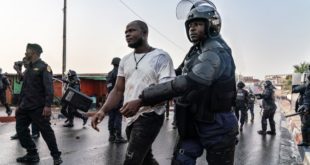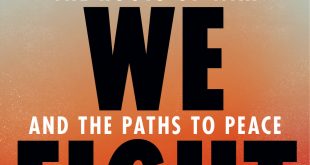That is my op-ed today in the L.A. Times. I really do think the ruin of war is a useful lens to look at conflict. It also helps us see how this conflict might end, why it might end faster if NATO is unconditional in its support for Ukraine, and why I think that stance is worth the great risks it entails. First, the rest of the op-ed:Even Vladimir Putin, author of the world-changing conflict in Ukraine, tried to avoid war in his own insidious way. For two decades, he employed every underhanded...
Read More »When will the costs of war force peace in Ukraine?
It’s easy to see the war in Ukraine as a sign of an inescapably violent world. But if the future looks bleak, perhaps that’s because we focus on the conflicts that happen and overlook the gravitational pull of peace.An example came on March 9, two weeks into the Russian invasion. Shortly after sundown, India accidentally launched a cruise missile at Pakistan. Predictably, calm ensued. Both sides strove to avoid escalation — as they have for decades.Focusing on the times peace fails is a kind...
Read More »Join an online event with USIP, or get a discounted copy of the book
One June 2, 11am-12pm EDT, the U.S. Institute of Peace is hosting an online conversation between me and Raj Kumar, head of DevEx about Why We Fight. Register at that link to join. Those in the US may also order a 20% discounted copy of the book here. It will ship shortly after the event. The next few weeks I’ll be doing live and hybrid events with the World Bank, IRC, USAID, and others. The fall I’ll be speaking at universities again. If your organization or school is interested in an...
Read More »Interview with Atlantico (France)
La police arrête un homme en marge des manifestations contre l'aggravation de la crise économique, à Monrovia, au Libéria, le 6 janvier 2020.©Carielle Doe / AFPSolutions optimalesLa thérapie cognitivo-comportementale (TCC) peut contribuer à réduire les comportements délinquants chez les jeunes à risque et chez les hommes ayant déjà commis des actes répréhensibles. Cette méthode a permis de lutter efficacement contre la violence au Libéria, selon une nouvelle étude de professeurs et de...
Read More »Big Brains podcast
Show Notes War is costly, deadly and destructive. So, why do we do it? In his new book Why We Fight: The Roots of War and The Paths to Peace, Prof. Chris Blattman of the University of Chicago lays out the five main reasons why countries go to war—and why building peace is actually a lot easier than we may think. Blattman is an economist and political scientist who studies global conflict, crime and poverty. As a seasoned peacebuilder, he has worked in a...
Read More »Readers: A humble request
If you’ve enjoyed the posts, the links, and the advice columns over the years, I have a request. Those of you who have gotten my book Why We Fight: Reviews are extremely helpful for sales and marketing. Please consider writing one, or even leaving a starred rating without a formal review. The most helpful thing is to post both on the site you bought the book and on Goodreads. After Goodreads, here are links to the book on Amazon US, Amazon UK, Amazon Canada, and other booksellers with links...
Read More »Join book events in New York, DC, and online
[unable to retrieve full-text content]I’ll be organizing events in more cities, but in the meantime I’d invite you to join in person or online the following events. If you’d like to organize or suggest an event online or in-person, please go here. New York and online: Tomorrow April 27, 6-7pm ET: Andaz Hotel in Midtown, hosted by UChicago. Details […] The post Join book events in New York, DC, and online appeared first on Chris Blattman.
Read More »Why We Fight is out April 19, available for pre-order!
Through Amazon and other sellers, plus a UK release 10 days earlier. Decades of social science completely changed how I think about conflict. But no one seemed to be talking about these ideas. How do you fix a problem if you don’t understand it? That’s why I wrote this book: to boil down for a general audience the big ideas from political science, economics, psychology, history, and a dozen other fields. A lot of people think war is easy and peace is hard. It’s actually the opposite: war is...
Read More » Heterodox
Heterodox


